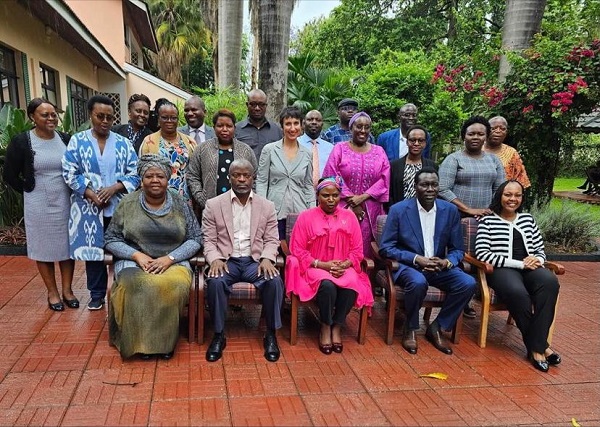Lobby groups are pushing for a regional legislation to ban single use plastic materials as the threat the latter pose to human health, aquatic wildlife and the food system across East Africa reaches alarming level.
Environmentalists have, for instance, raised alarm over the continued presence of microplastics – the tiny harmful plastic fragments — in all locations of Lake Victoria, one of the key East Africa water bodies shared by Uganda, Kenya and Tanzania. Inaction threatens livelihoods of millions who depend on the Lake for a living, suggest recent studies.
Despite majority of countries in the region having moved to enforce bans on plastics, slow enforcement and the transboundary nature of the problem continue to foment a disaster that could deplete the fish stocks, compromise water quality and pose a risk to public health.
Plastic pollution is exacerbated by the prevailing inefficient waste management and poor disposal, and individual countries’ efforts may not tackle the crisis effectively, experts say.
“Plastic pollution knows no borders. Discarded waste in Lake Victoria will not tell which side is Uganda or which side is Kenya, and it’s a challenge to monitor porous borders. We need to have a common legal framework to deal with the problem,” said Rosa Nduati-Mutero, Managing Partner at Africa Legal Network (ALN), the Nairobi-based law firm pushing for the regional ban through a legislation drafted jointly with the UN Conference on Trade and Development (UNCTAD), the Sustainable Manufacturing and Environmental Pollution (SMEP) programme and the FlipFlopi Project.
The latter is a Kenya-based movement working to end single use plastic in the region.
A new Bill backed by the group was on November 10 submitted to the Arusha-based East African Legislative Assembly (EALA) for consideration by the regional parliament’s committee on Agriculture, Tourism and Natural Resources.
Plastic pollution knows no borders. Discarded waste in Lake Victoria will not tell which side is Uganda or which side is Kenya, and it’s a challenge to monitor porous borders. We need to have a common legal framework to deal with the problem
Rosa Nduati-Mutero, Managing Partner, Africa Legal Network (ALN)
If adopted, the legislation could see all non-essential single use plastic items — from cutlery, plates, cups, cotton buds, straws, balloons, sweet wrappers to wet wipes and others — banned across all the seven EAC countries.
“We are grateful to the committee for receiving our Bill and sharing their contributions as well as unanimously agreeing that harmonized regional legislation is the best way forward for East Africa,” Carlotta Dal Lago, head of business development, marketing and communication for ALN, wrote in a LinkedIn post shortly after submitting the proposed legislation Friday.

Rwanda, Tanzania, DR Congo and Kenya have taken legislative actions in line with tackling the single use plastic materials mostly with exceptions, and they are at dissimilar levels of enforcement amid lack of substitutes or alternatives, and other constraints.
Peers such as Uganda, South Sudan and Burundi still struggle to institute such bans.
Implications
But none is spared by the transboundary threat of plastic pollution as documented in a 2021 study carried out in the course of FlipFlopi’s series of plastic pollution awareness-raising boat expeditions across the region.
Samples collected from different locations in the Ugandan, Kenyan and Tanzanian waters of Lake Victoria, which were investigated in the laboratory pointed to the presence of harmful microplastics in all parts of the Lake irrespective of locality and national boundaries.
Consequently, as waste volumes increase, aquatic wildlife like fish feed on these harmful pollutants and eventually die. If unchecked, this will take a toll on the fish stocks of Lake Victoria, definitely resulting in the loss of livelihoods for communities that depend on the lake across the three countries and beyond. Water and soil quality, too, get compromised.
Also read: What Kigali bird numbers tell us about life in Rwanda
Going forward, all eyes will be on governments in the region to enforce a common legal framework to deal with the plastic pollution menace before it’s too late, in addition to working together to speak with one voice in ongoing push for a global treaty to end plastic pollution.
Week-long negotiations
Negotiations towards a global binding instrument against plastic pollution has been under discussion at the United Nations, and negotiators are expected in Nairobi on November 13 for a week-long meeting to iron out contentious issues in the hope to urgently come up with a treaty that can check rising harmful plastic production.
The global plastic production trend has been on the rise with estimated 369 million tons of plastics (worth $1.2 trillion) having been traded in 2020 alone, a significant increase from $933 billion the year before, according to UNCTAD’s 2022 data.
Africa is responsible for only 5 per cent of global plastic production. However, the continent bears a huge burden (at 24 percent) of global emissions from mismanaged plastic waste, according to a 2018 study by UN Environment Programme which mapped the global plastics value chain.
The Africa group is understood to be pushing for a global Extended Producer Responsibility (EPR), the arrangement where the producer is compelled to follow through on how the products are disposed off after use, and is held responsible for pollution arising thereof.
“We as the Africa group are asking that producers be responsible for plastic waste treatment. Another issue is legacy waste in our dumpsite. We have them and they were dumped there 50 or 60 years ago. We cannot talk of a global treaty that ignores the past. That’s also a key area of negotiation,” said Kenya environment management authority’s Dr. Ayub Macharia, Director in charge of environmental compliance.
Macharia was speaking at the recently-concluded annual Circular Economy Conference in Nairobi, which this writer attended.
Also read: Will historical emitters heed Africa call for debt-for-climate swaps?


